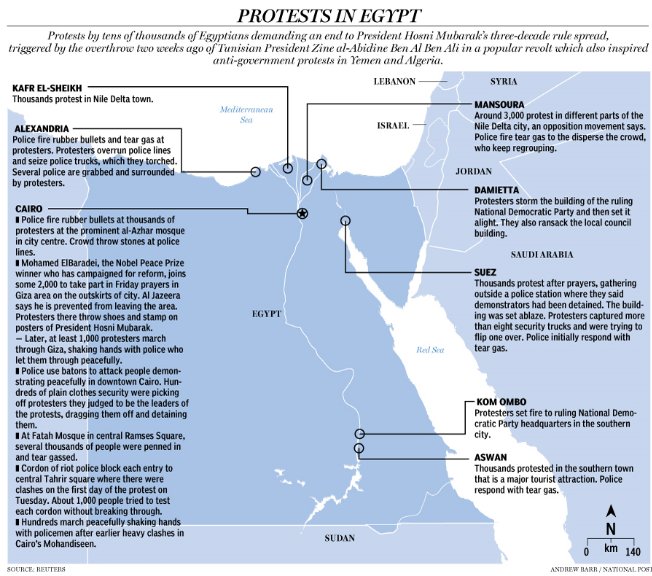Updates added to the bottom of this post
The Egyptian government is attempting to foil protests by eliminating internet traffic. Renesys reports:
Confirming what a few have reported this evening: in an action unprecedented in Internet history, the Egyptian government appears to have ordered service providers to shut down all international connections to the Internet. Critical European-Asian fiber-optic routes through Egypt appear to be unaffected for now. But every Egyptian provider, every business, bank, Internet cafe, website, school, embassy, and government office that relied on the big four Egyptian ISPs for their Internet connectivity is now cut off from the rest of the world. Link Egypt, Vodafone/Raya, Telecom Egypt, Etisalat Misr, and all their customers and partners are, for the moment, off the air.
At 22:34 UTC (00:34am local time), Renesys observed the virtually simultaneous withdrawal of all routes to Egyptian networks in the Internet’s global routing table. Approximately 3,500 individual BGP routes were withdrawn, leaving no valid paths by which the rest of the world could continue to exchange Internet traffic with Egypt’s service providers. Virtually all of Egypt’s Internet addresses are now unreachable, worldwide.
I have seen very little traffic coming to this site from Egypt before the DNS server shutdown (under 40 unique visitors last year, according to FlagCounter), so the following information isn’t likely to be of direct assistance to Egyptians, but hopefully some can be filtered onwards.
The first suggestion (from Shereef Abbas) is to use Google’s Public DNS 2 to change “your DNS ‘switchboard’ operator from your ISP to Google Public DNS”.
John Perry Barlow suggests “more tools to access blocked websites and maintain anonymity”: http://jan25.in/how-to-access-blocked-websites-by-government and https://www.torproject.org/download/download.html.en.
Update: Vice President Joe Biden appears to be missing a wonderful opportunity to shut up.
Biden urged non-violence from both protesters and the government and said: “We’re encouraging the protesters to – as they assemble, do it peacefully. And we’re encouraging the government to act responsibly and – and to try to engage in a discussion as to what the legitimate claims being made are, if they are, and try to work them out.” He also said: “I think that what we should continue to do is to encourage reasonable… accommodation and discussion to try to resolve peacefully and amicably the concerns and claims made by those who have taken to the street. And those that are legitimate should be responded to because the economic well-being and the stability of Egypt rests upon that middle class buying into the future of Egypt.”
Egypt’s protesters, if they’re paying attention to Biden at all, will certainly be wondering which of their demands thus far have been illegitimate.
Update, the second: Live blogging the protests at the Guardian. And several sources are recommending the coverage streamed online from Al Jazeera’s English-language site.
Update, the third: The effectiveness of Egypt’s internet blackout shows why giving the American president (or any national leader) an internet “kill switch” is such a bad idea. To most of us, anyway. I’m sure that to some people it’s an argument in favour.
Update, the fourth: National Post has a graphic showing the locations of the reported activity:




